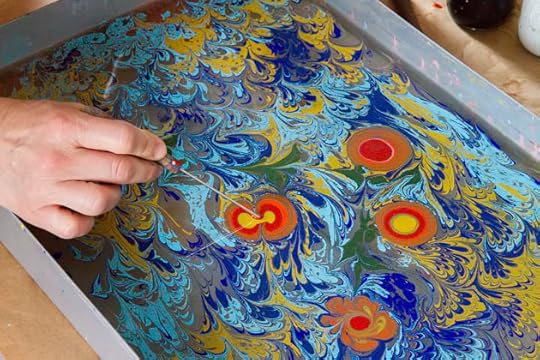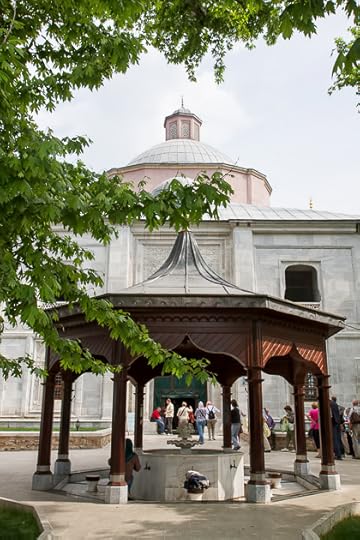Michael Powell's Blog, page 112
June 21, 2013
Hidden Corners Behind the Grand Bazaar
Istanbul is the kind of place which favors bold exploration, as we learned after an exciting day spent exploring the maze of streets around the Grand Bazaar. The city is filled with quiet, secret spots… if you can muster up the courage to go down that darkened hall, into that empty courtyard, or up those crumbling stairs.

Of course, I’m not recommending that anyone skip off willy-nilly into Istanbul’s abandoned buildings. We ventured into a couple places that I would never venture into were I...
June 20, 2013
An Introduction to Turkish Marbling
Marbling, or ebru, is one of the most popular forms of Turkish art. We decided to introduce ourselves to the technique by joining a workshop offered by Les Arts Turcs in Sultanahmet. By the end of the entertaining session, we had managed to create a few minor masterpieces.

Ebru has been a part of the Turkish art scene for centuries, and has long been a specialty of Istanbul’s dervish orders. Contributing to the technique’s popularity is the fact that it’s easy to learn; even an absolute beginn...
June 17, 2013
Muradiye, Çekirge and Random Bursa Pics
Introduction | The Green Mosque and Tomb | Gazi Plaza and the Market | Karagöz Puppets
Bursa is stretched out along the base of Mount Uludaĝ, and so its main sights are laid out on a long, almost straight line. The Yeşil Camii to the east, Gazi Park in the center, and the lovely neighborhood of Muradiye to the east. Even further east is Çekirge, home to the city’s famous thermal spas.

Though it’s a few kilometers from the city center, the neighborhood of Çekirge is th...
The Karagöz Puppets of Bursa
Introduction | The Green Mosque and Tomb | Gazi Plaza and the Market | Muradiye and Around
Karagöz shadow puppetry, one of Turkey’s most distinctive art forms, was born in Bursa: still the best (and perhaps only) place in the world where you can catch a regular performance. The Karagöz Museum puts on daily shows starring the puppets which have kept Turkey in stitches for hundreds of years.

Karagöz puppetry dates back to the 14th century, when Bursa was still the capit...
Gazi Park and Bursa’s Covered Market
Introduction | The Green Mosque and Tomb | Karagöz Puppets | Muradiye and Around
The heart of Bursa is charming Gazi Park, book-ended on east and west by two amazing mosques, and bordering the city’s covered market. It was the logical place to begin our exploration of the city. If we’d had more time in the city, we could have happily spent an entire day here.

The Ottoman Empire is generally thought to have emerged in 1299, beginning with the ascension of Osman Gazi. O...
June 16, 2013
The Green Mosque and Tomb of Bursa
Introduction | Gazi Plaza and the Market | Karagöz Puppets | Muradiye and Around
The neighborhood of Yeşil (Green), separated from the city center by the Gök Dere river, takes its name from Bursa’s most well-known sights: the Green Mosque and Tomb. Visible from across Bursa, the mausoleum sits atop a hill and is covered in monochrome tiles of a unique light-green color.

Green is definitely the color of Bursa. Its most famous mosque complex is decorated in green tiles....
An Excursion to Bursa
The Green Mosque and Tomb | Gazi Plaza and the Market | Karagöz Puppets | Muradiye and Around
Bursa is Turkey’s fourth-largest city, and was capital of the Ottoman Empire a hundred years before Constantinople had even been conquered. It makes for a great excursion from Istanbul, almost directly across the Sea of Marmara.

“Excursion”, I say. “Day Trip”. We planned for about a day and a half in Bursa. This is a city of 1.7 million people. That’s more than the entire sta...
June 15, 2013
SALT and the Ottoman Bank Museum
Established in 1856, the Ottoman Bank was a part of a comprehensive effort to modernize the flagging Ottoman Empire. Today, its former headquarters in Galata is home to SALT: a non-profit organization dedicated to art, architecture and urbanism.

The ambitious period of reform known as the Tanzimat Era introduced a number of new concepts to the struggling Ottoman Empire, which was trying to reorganize itself along the lines of more successful Western countries. Post offices, a national anthem,...
Kız Kulesi – The Maiden’s Tower
A stone’s throw off the coast of Üsküdar, the Maiden’s Tower is one of Istanbul’s most instantly recognizable landmarks. It’s been a place of intrigue, legend and strategic importance since the city’s earliest days.

Historical accounts mention the Kiz Kulesi as a toll station used by the Greeks as far back as the 5th century BC. The Byzantines used it to chain off the Bosphorus, and thus extract a levy on ships entering and leaving the Black Sea. And the Ottomans used it as a watchtower.
All of...
Çengelköy and the Beylerbeyi Palace
There’s no shortage of charming neighborhoods lining the shores of the Bosphorus, but lovely little Çengelköy is among the very best of them. We had breakfast here on a Sunday morning, before walking along the coast to the incredible Beylerbeyi Palace.

Çengelköy literally means “Hook Village”, and was so named because it occupies a section of shoreline that hooks around a bend in the Bosphorus. The layout provides a perfect view of the strait, south to the Bophorus Bridge and into the Sea of M...



